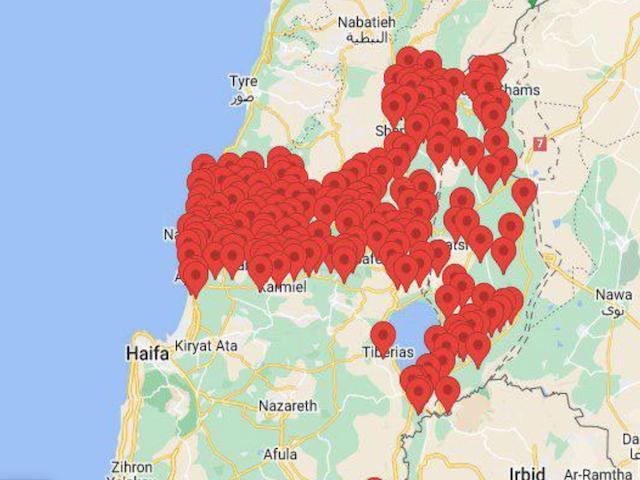August 2023 marked the most intense month of rocket fire from Lebanon towards Israel since the beginning of the year, according to the Israeli internal security agency, Shin Bet. In August alone, Hezbollah and affiliated groups launched a staggering 1,307 rockets from the northern front, which includes Lebanon and Syria. This amounted to an average of over 40 rockets per day, a sharp increase from the 1,091 rockets fired in July and significantly higher than the numbers seen earlier in the year. The trend indicates a relentless escalation, with Hezbollah appearing determined to test Israel's defenses and patience.
The surge in attacks began on October 8, 2023, when Hezbollah launched an offensive against Israel in the wake of a deadly assault by Hamas on Israeli territory. Hezbollah's actions were framed as "support" for the Palestinian population in Gaza, where Israel's military was engaged in strikes against Hamas. This offensive included not only rockets but also targeted attacks on Israeli communities, and the impact has been felt far and wide across northern Israel.
Hezbollah's Tactical Expansion: A Strategic Game of Inches
Hezbollah's attacks intensified throughout August, expanding the "firing schedule" to include more Israeli communities. According to pro-Iranian media like Al-Mayadeen, Hezbollah began specifically targeting areas such as Kibbutz Neot Mordechai, even though these communities had already been under threat for nearly ten months. This tactical shift is more than just an escalation; it's a calculated attempt by Hezbollah to slowly expand the scope of its aggression, gradually moving the goalposts and carving out new areas it claims the right to target. This methodical approach has included increased attacks on regions like Shamir, Ayalet HaShachar, and even the Golan Heights.
🚨⚡During August.
— War Analysis (@iiamguri9) September 5, 2024
Hezbollah launched 1,307 rockets from Lebanon towards the entity, at a rate of more than 40 launches per day.
It is the month with the most firing from the north since the beginning of the war.#Hezbollah #Lebanon #Israel pic.twitter.com/lQZDJ70ziy
Since the beginning of the year, Hezbollah has launched over 8,600 rockets at Israel, a staggering statistic that underscores the severity of the threat. By the end of July, the group had already fired approximately 7,500 rockets, but August marked a peak in intensity. The group's arsenal includes not just rockets but also around 200 UAVs (Unmanned Aerial Vehicles), which have been used in various attacks according to an August report by Ynet.
Propaganda and Perception: Hezbollah's Messaging to Its Allies
Hezbollah's strategy goes beyond mere military aggression; it also includes a sophisticated propaganda campaign aimed at its supporters in Lebanon, Iran, and across the region. The group consistently portrays its actions as defensive measures in response to Israeli "occupation" and attacks on Lebanese villages. For instance, Hezbollah claimed that its attacks on Israeli positions, including artillery sites at Al-Zaoura, Al-Marj, and Al-Samaqa, were in retaliation for Israeli strikes that allegedly led to civilian casualties in southern Lebanon.
A recent Al-Mayadeen report echoed this narrative, highlighting Hezbollah's claim that it had "placed Neot Mordechai on its firing list for the first time." This messaging is a calculated effort to project strength and expand Hezbollah's image as a defender of Lebanese sovereignty, even when the targeted areas had already been under consistent threat for months.
Map of target zones for current major rocket attack by Hezbollah. pic.twitter.com/NLn2QV3oPp
— Jewish News Syndicate (@JNS_org) September 5, 2024
A Calculated Escalation: Testing Israel's Resolve
Hezbollah's actions reflect a calculated escalation, carefully measured to increase pressure on Israel without triggering a full-scale retaliation. By expanding its attacks to already targeted areas, Hezbollah is attempting to escalate the conflict incrementally. This strategy allows Hezbollah to demonstrate its capabilities to its supporters and patrons in Tehran without provoking an overwhelming Israeli response that could lead to a broader conflict.
The ongoing barrage of rockets, including over 100 launched on September 4 alone, suggests that Hezbollah is not merely testing the waters but actively pushing the boundaries of what it can achieve without sparking a significant Israeli counter-offensive. This deadly game of brinkmanship keeps northern Israel on constant high alert, with residents living under the perpetual threat of rocket fire.
80,000+ Israelis in northern Israel have been forced from their homes after nearly 11 months under Hezbollah attack, including Liat Cohen Raviv.
— AIPAC (@AIPAC) September 4, 2024
Liat and her family are from Metula, where over 200 houses have been directly hit by a Hezbollah rocket.
This is Liat's story 👇 pic.twitter.com/JRfwjkNWyc
As Hezbollah continues its aggressive campaign, the question remains: will the group sustain this level of intensity, or is a larger escalation on the horizon? The answer will likely depend on the broader geopolitical dynamics in the region, including the evolving relationship between Iran and its proxies, as well as Israel's strategic calculus in dealing with an increasingly volatile northern border.


